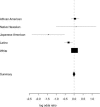Genetic variation in the HSD17B1 gene and risk of prostate cancer
- PMID: 16311626
- PMCID: PMC1287955
- DOI: 10.1371/journal.pgen.0010068
Genetic variation in the HSD17B1 gene and risk of prostate cancer
Abstract
Steroid hormones are believed to play an important role in prostate carcinogenesis, but epidemiological evidence linking prostate cancer and steroid hormone genes has been inconclusive, in part due to small sample sizes or incomplete characterization of genetic variation at the locus of interest. Here we report on the results of a comprehensive study of the association between HSD17B1 and prostate cancer by the Breast and Prostate Cancer Cohort Consortium, a large collaborative study. HSD17B1 encodes 17beta-hydroxysteroid dehydrogenase 1, an enzyme that converts dihydroepiandrosterone to the testosterone precursor Delta5-androsterone-3beta,17beta-diol and converts estrone to estradiol. The Breast and Prostate Cancer Cohort Consortium researchers systematically characterized variation in HSD17B1 by targeted resequencing and dense genotyping; selected haplotype-tagging single nucleotide polymorphisms (htSNPs) that efficiently predict common variants in U.S. and European whites, Latinos, Japanese Americans, and Native Hawaiians; and genotyped these htSNPs in 8,290 prostate cancer cases and 9,367 study-, age-, and ethnicity-matched controls. We found no evidence that HSD17B1 htSNPs (including the nonsynonymous coding SNP S312G) or htSNP haplotypes were associated with risk of prostate cancer or tumor stage in the pooled multiethnic sample or in U.S. and European whites. Analyses stratified by age, body mass index, and family history of disease found no subgroup-specific associations between these HSD17B1 htSNPs and prostate cancer. We found significant evidence of heterogeneity in associations between HSD17B1 haplotypes and prostate cancer across ethnicity: one haplotype had a significant (p < 0.002) inverse association with risk of prostate cancer in Latinos and Japanese Americans but showed no evidence of association in African Americans, Native Hawaiians, or whites. However, the smaller numbers of Latinos and Japanese Americans in this study makes these subgroup analyses less reliable. These results suggest that the germline variants in HSD17B1 characterized by these htSNPs do not substantially influence the risk of prostate cancer in U.S. and European whites.
Conflict of interest statement
Competing interests. The authors have declared that no competing interests exist.
Figures


References
-
- Schaid DJ. The complex genetic epidemiology of prostate cancer. Hum Mol Genet. 2004;13((Spec No 1)):R103–R121. - PubMed
-
- Simard J, Dumont M, Labuda D, Sinnett D, Meloche C, et al. Prostate cancer susceptibility genes: Lessons learned and challenges posed. Endocr Relat Cancer. 2003;10:225–259. - PubMed
-
- Bruner DW, Moore D, Parlanti A, Dorgan J, Engstrom P. Relative risk of prostate cancer for men with affected relatives: Systematic review and meta-analysis. Int J Cancer. 2003;107:797–803. - PubMed
-
- Houlston R, Peto J. Genetics and the common cancers. In: Eeles R, Ponder B, Easton D, Eng C, editors. Genetic predisposition to cancer. London: Chapman & Hall; 2004. pp. 235–247.
-
- Lichtenstein P, Holm N, Verkasalo P, Iliadou A, Kaprio J, et al. Environmental and heritable factors in the causation of cancer—Analyses of cohorts of twins from Sweden, Denmark and Finland. N Engl J Med. 2000;343:78–85. - PubMed
Publication types
MeSH terms
Substances
Associated data
- Actions
- Actions
- Actions
- Actions
- Actions
- Actions
- Actions
- Actions
- Actions
- Actions
- Actions
Grants and funding
LinkOut - more resources
Full Text Sources
Other Literature Sources
Medical

